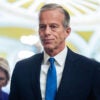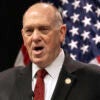
During President Obama’s address to a joint session of Congress last night, Heritage analysts and scholars offered advice and criticism of policies said and unsaid. From Foreign Policy to Nuclear Energy to price controls on the economy, Heritage covered it all:
Theodore Bromund: No Love for Our Allies
On the Fox News Channel, correspondent Major Garrett predicted that foreign policy would come at the “tail end” of Obama’s speech. No kidding. If this had been a real State of the Union address, you might be pardoned for thinking that this Union was not just the first but also the only nation in the world, and that the foremost force of evil in today’s world is not its dictators but America’s banks, CEOs, and oil companies.
The most immediately striking thing about the speech was that it dealt with foreign policy almost solely in terms of Iraq and Afghanistan.
Both are vital, and Obama said what he was expected to say: withdraw responsibly in Iraq and refuse to allow Al Qaeda to triumph in Afghanistan. On Iraq, with the situation having been stabilized by the surge that Obama opposed, his lack of commitment is less glaring and shameful that it would have been a year ago. On Afghanistan, his promise to forge a new and comprehensive strategy with America’s friends and allies — none of whom were dignified with a mention by name — promised conclusions soon but gave little away.
But a hint did emerge. What was most striking about Obama’s remarks on Afghanistan — and Pakistan — was that he defined the problem as defeating Al Qaeda and combating extremism. The latter may, certainly, be a code word for the Taliban. But, equally, by failing to mention the Taliban, Obama has laid the foundations for an attempt to redefine the challenge as one posed by Al Qaeda alone.
If so, the comprehensive strategy that he promises may be one that seeks to reconcile with the Taliban while continuing isolated strikes against terrorist safe havens. Indeed, his strongest promise of all on national security issues was his assurance that he would not allow such safe havens to plot against the U.S. That promise, firm in isolation, foreshadows a return to the Clinton-era policy of counter-terrorism by cruise missile, just as his promise of “swift and certain justice” for captured terrorists implies a return to the view that terrorism is largely a law enforcement issue. If so, he will be returning to a well-trodden and failed path, one that led directly to 9/11.
The other major issues in international affairs passed by only in review, if at all. His pledge to work for a secure and lasting peace between Israel and its neighbors was necessary, but also necessarily avoided all the difficult questions. His rejection of protectionism was clear, but sat uneasily with his demand for energy independence, his support of the US auto industry, and his pledge to work with the G20, which looks likely to be dominated by the job-destroying global governance vision of Europe. His claim that America is stronger when it lives its values was ringing, but evaded the challenges of fighting a global war against terrorists who reject the entire international state system in which those values are based. His call for a strong national defense was coupled with a rejection of Cold War weapons systems, a phrase that bodes ill for missile defense. And his vision of security issues — terrorism , proliferation, disease, cyberthreats, and poverty — was the usual expansive laundry list that defined security so broadly as to cheapen the concept.
This was not an isolationist speech. But it was one in which, with the sole and neutral acknowledgment of Israel, American stood entirely alone. The support of Britain, Canada, Australia, and the Netherlands in Afghanistan went unmentioned, as did all of America’s allies in East Asia. So, curiously, did India, an omission highlighted by Gov. Bobby Jindal’s folksy response. Nor did Obama say a good word for freedom, democracy, or liberty abroad, an omission that will surely be noticed in Venezuala, China, Russia, and Iran, all of whom also fell by the wayside.
Above all, it left the sense of an America turning inward, eager to sound engaged but unwilling to notice that engagement requires painful commitments by allies that deserve to be acknowledged, and confrontations not simply with abstract forces like hunger, but with dictators and tyrants who wish us harm. Its domestic preoccupations were understandable, but they foreshadow a foreign policy based both on expansive phrases and a dangerous unwillingness to make hard choices.
David John: Obama’s Goals v. Congressional Priorities
On financial issues, the president’s speech was a mixture of worthy goals and worrying generalities.
For instance, he announced that “First, we are creating a new lending fund that represents the largest effort ever to help provide auto loans, college loans, and small business loans to the consumers and entrepreneurs who keep this economy running.”
Is this some new federal lending fund that will compete with banks and other financial institutions? If so, the new fund would appear to weaken the very financial institutions that he wants to strengthen.
However, then he went on to list restrictions that would make it much harder to accomplish his goals, and given the statements of the president’s allies in congress, may result in attempts to micro-manage a crucial part of the economy.
Finally, he asked congress “to move quickly on legislation that will finally reform our outdated regulatory system. It is time to put in place tough, new common-sense rules of the road so that our financial market rewards drive and innovation, and punishes short-cuts and abuse.”
This is yet another worthy goal, especially given the actions of many in bank management, but again the statements of his allies in the House and Senate banking committees make one wonder if this won’t end up being yet more attempts to direct lending to specific groups regardless of their credit worthiness, while loading banks down with picky requirements that stifle innovation. The details of his proposal will be essential reading – as will the responses of the two banking committee heads.
Bob Moffit: Price Controls Are Not the Answer
President Barack Obama has outlined an ambitious goal of making sure that every American has quality affordable health care. He says that health reform cannot wait, and that it must be done this year. Few Americans would disagree with the President’s goals.
Quality of care cannot be achieved by restrictions on personal choice or competition among plans or providers. Quality is driven by innovation, investment, and the ability of medical scientists and clinicians to experiment with new and different medical treatments and procedures. Care that is of high quality and also affordable can never be achieved through the imposition of price controls. Nor can Americans enjoy cost control or efficiency in the delivery of care outside of the discipline of a free market.
We can achieve the goals that the President has set forth in health reform by ensuring that all Americans, without exception, have direct control over the flow of health care dollars in both the public and the private health care sectors of the economy,where they can directly secure value for those dollars and vote with their feet when they don’t get it.
The President has also acknowledged that there are different ideas about how to achieve the goals of reform, and he has invited his fellow Americans, including Republicans, and presumably conservatives, to join in this effort as early as next week. This is a welcome invitation, and conservatives in Congress and elsewhere should quickly accept it.
Bipartisanship is essential for successful health care reform. While eager to accept an invitation to enagage, it is worth noting that bipartisanship was not at all evident in the recent congressional consideration of the reauthoritzation of the State Children’s Health Insurance Program, or the far reaching health care provisions of the stimulus bill, ranging from health information technology to comparative effectiveness research, that were enacted with little deliberation or debate.
Jack Spencer: What About Nuclear?
If President Obama is serious about his energy objectives then how can he forget nuclear energy? He says that he wants to reduce CO2 emissions, create jobs and get America off foreign oil.
But his solution is to double renewable energy.
The problem is that despite years of state and federal preferences, non-hydro renewable energy only provides about 2.5 percent of the nation’s electricity. Even doubled, this would hardly make a difference.
On the other hand, the United States has 104 operating nuclear reactors that provide 20 percent of its electricity (about 70 percent of its CO2-free electricity). And this is despite not having ordered a new plant in nearly three decades.
He wants jobs. While jobs are leaving the economy in droves, the nuclear sector has created some 15,000 jobs in the past couple of years. And that is before a new plant has even started construction.
And the versatility of nuclear technology can help the U.S. bring about the sort of energy transformation that the President says he wants. It will be this that can break America’s dependence on foreign oil.
So how can the President reduce CO2, create jobs, and expand domestic energy sources? Well it is easy and it goes something like this:
- Fast-track the permitting process of new nuclear plants. It takes four years to get a permit to construct a plant. That is too long.
- Commit to supporting the Nuclear Regulatory Commission’s review of the Department of Energy’s application to construct the Yucca Mountain nuclear waste respository.
- Develop a market based solution for managing spent nuclear fuel.
David John: Entitlement Reform We Can Believe In
President Obama said – “And we must also begin a conversation on how to do the same for Social Security, while creating tax-free universal savings accounts for all Americans”
The president recognizes the need for all Americans to be able to save for retirement and other purposes. This would include making retirement savings available to all workers such as the Heritage/RSP plan for Automatic IRA, which would allow small business employees to have a simple, low cost payroll deduction retirement savings account. We hope to see Auto IRA in the president’s coming budget.
J.D. Foster: Tax Raises Everywhere
President Obama makes a big deal about not raising taxes on any family making less than $250,000 a year. While much can be said about the economic effects of this policy, the fairness of raising taxes on those who already pay most of the freight, and related issues, they are not the central issue.
The central issue is the American people have every reason not to believe the President in this most fundamental point, a point on which he said “make no mistake’. Why should they not believe him? Because he has already broken his promise, already broken his word, already made his mistake. When he signed the SCHIP expansion into law, he signed a huge increase in the federal excise tax on cigarettes. One need not be a fan of tobacco companies or smoking to note that this tax is paid almost exclusively by those earning less than $250,000 a year. He has already raised taxes on the non-rich. Why should anyone believe him now when he says he won’t raise taxes on these same taxpayers again?
The central issue as far as tax policy is trust. The President has already broken the trust when it comes to raising taxes.
But wait, there’s more. Obama threatens to raise taxes not just on rich retired bankers, but on small businesses that pay tax at the individual rates. He threatens to raise taxes on the returns to risk-taking, the life blood of the economy in normal times, and the source of recovery during recession. The simple, unequivocal fact is that President Obama is sacrificing economic strength at the alter of progressive redistributionism.
Nor can this policy even be said to be material to the budget deficit. The size of the tax hike for those affected can be enormous. But relative to the size of the budget or total tax collections, the revenues raised in pursuit of this Robin Hood philosophy simply don’t move the dial.
Nick Loris: Obama’s Costly Energy Taxes
Paraphrasing Obama on energy tonight: We need to make clean, renewable energy a profitable type of energy. Investing in renewable energy is one of three items we must spend on – it will create jobs, reduce our dependence on foreign oil, and ultimately help to curve global warming. Give me a cap-and-trade bill and I will sign it.
Investing in renewable technology and green jobs diverts resources that could have otherwise gone to more efficient means of use. In reality, if investments in renewable, clean energy technology were such a good idea, someone from the private sector would jump on such an opportunity and take it to the bank. Despite years of special treatment, the investment in wind, solar and other renewable technology has been relatively small.
If any energy source has the potential to compete in the market, it should be allowed to do so without question. But the more the government uses taxpayer dollars to invest in renewable energy, the more the government puts traditional sources of energy at a competitive disadvantage. Presumably that’s the point. Crowding out investment in coal and oil will make room for unconventional sources of energy but at the cost of the consumer who will end up paying higher electricity bills and could face of rolling brown outs or blackouts.
With green investment supposedly comes green jobs but this is also an example of allocating funds that could have been efficiently used elsewhere. Moreover, green jobs don’t necessarily mean good jobs. A recently released report shows that many green jobs do not pay well. And where do low-paying jobs often go? Out of the country. So to stimulate our economy, we’re not creating jobs, but instead displacing them with low-paying jobs that have a higher probability of being outsourced.
On top of all the money for green technology investment in the stimulus bill, more “green stimulus” investments in renewable energy will simply be a waste of money. Furthermore, as Heritage Senior Policy Analyst Ben Lieberman writes, a green stimulus is a contradiction in terms:
The environmental movement itself is, by design, anti-growth. After all, these are the individuals and organizations that regularly fight to stop new factories, power plants, and construction projects. For them, environmental concerns, real or exaggerated, almost always trump economic ones, and it is rare for them to be lacking an excuse to oppose a project.
Overall, an economy that tries to operate to the satisfaction of environmental activists will be a substantially weakened one, and an attempt at a stimulus via a greening of the economy will always be self-defeating and a net job killer.
Investing in renewable technology and green jobs does all the things we shouldn’t be doing to dig out of a recession and to keep energy prices affordable in the future.
As far as cap-and-trade goes, Obama mentioned nothing will come without cost. But, before asking Congress to send him a cap-and-trade bill, he should weigh the costs versus the benefits of implementing such a policy. The Heritage Foundation’s Center for Data Analysis calculated the costs of global warming cap-and-trade legislation in the U.S. alone and the cumulative GDP losses for 2010 to 2029 approach $7 trillion. Single-year losses exceed $600 billion in 2029, more than $5,000 per household. Annual job losses exceed 800,000 for several years. That’s a scary price to pay for what little, if any, environmental benefits we receive. And doing so now will only exacerbate this tough recession.
Dan Lips: Education Rhetoric Not Left Behind
In his address, President Obama joined his predecessors from LBJ through George W. Bush who offered a lofty goal for improving American education. Instead of promising to leave “no child left behind,” he stated that dropping out of high school is no longer an option in the Obama era. If only wishing it made it so. Unfortunately, promises made in Washington dating back to the 1960s have done little to improve the condition of public schools in America.
One wonders what President Obama’s plans for solving the dropout crisis are. In his hometown of Chicago, for example, fewer than half of all children currently graduate high school. No amount of federal spending, and no federal program will solve that problem. The truth is that fixing broken public school systems like Chicago’s will require serious reforms like school choice that give parents and school leaders the power to choose and deliver the best learning environment for their children.
It remains to be seen whether the Obama administration will support real reform. But history has shown that what we’ve seen from them far so far–increasing federal spending and power–won’t fix the chronic problems in American education.
Joe Postell: Who’s Been Approving All That Spending?
Congress’s reactions don’t reflect an understanding of how government actually works. The Democrats applauded at the statement that we inherited a massive deficit, taking this to mean that President Bush was solely responsible. Sure, President Bush had plenty to do with this, but who has the power of the purse? Congress, including those same applauders, helped by appropriating that cash.
James Gattuso: A Walk for Detroit
More auto bailouts seem on the way, President Obama is saying. He sets forth a strong statement that we won’t protect Detroit from its own mistakes, but then goes on to indicate that we will do just that. What’s more, the industry will be “reimagined,” presumably by government bureaucrats. He concluded with a hint of economic nationalism, saying the nation that invented the automobile won’t walk away from it. No word on whether that includes support for Chrysler, which is now in alliance with Italy’s Fiat.
“Providing for the Common Defense” is a fundamental obligation of government. Obama’s challenge is to pay for what the Pentagon needs in the face spiraling national debt and the growing explosion of entitlement spending (numbers that dwarf the defense budget and all the spending for the wars in Iraq and Afghanistan combined). The speech suggests he has no clue how to do that—because all he did was repeat empty promises that he made on the campaign trail.
“We’ll eliminate the no-bid contracts that have wasted billions in Iraq,” Obama declared. These contracts accounted for a fraction of those issued in Iraq. In fact, the vast preponderance of Pentagon contracts are let through competitive bids—many go to small businesses. Despite dozens and dozens of official government audits since 2003 there is no credible evidence that eliminating “no-bid” contracting will save “billions.” Invoking the contractor equivalent of the “bogeyman” won’t buy the equipment and provide the support our men and women in arms need to protect themselves and serve the nation.
Obama also promised to “reform our defense budget so that we’re not paying for Cold War-era weapons systems we don’t use.” This was an empty campaign promise made over and over again—and never challenged by the press. Virtually every Cold War system in the inventory was used during the wars in Afghanistan and Iraq and during the operations after. Planes launched from Cold War aircraft carriers and Cold War submarines firing cruise missiles helped topple Saddam. Cold War B-52 bombers supported tribesmen fighting the Taliban in Afghanistan. Tanks built during the Cold War helped the “surge” save Iraq. As for new systems, they have all been put in production after the Cold War ended and justified by post-Cold War security challenges. Missile defenses are needed to guard against ballistic missiles from Iran and North Korea. Modern aircraft like the F-22 are required to penetrate modern air defenses. Ships and submarines are needed to project American power around the world. If the administration makes deep cuts in procurement it is not because our troops don’t need new equipment, it is simply because the White House wants to cut defense spending.
Brian Riedl: An Audacity Deficit
The budget deficit has already tripled to $1.2 trillion this year. So President Obama’s pledge to halve the budget deficit by 2013 is hardly ambitious. The end of the recession, phase-out of stimulus spending, and wind down of Iraq spending will halve the budget deficit on its own. Even though President’s budget assumes peace and prosperity by 2013, the $533 billion target budget deficit would still exceed those under President Bush (and that was while fully funding a war in Iraq.)
Furthermore, early indications suggest that tax increases would trump spending restraint in reducing the deficit. Spending would remain above 22 percent of GDP – a level that has been reached only 8 times in the past 62 years. Yet tax rates reportedly would rise for individuals and businesses in order to finance items such as a down payment on national health care. And the President is reportedly considering a statutory Pay-As-You-Go law, despite 20 years of Congress and Presidents ignoring PAYGO rules.
On taxes, President Obama stated “if your family earns less than $250,000 a year, you will not see your taxes increased a single dime. I repeat: not one single dime.” Yet he has already signed into law a 62-cent increase in the federal tobacco tax.
On the positive side, President Obama pledged to fundamentally reform Social Security and Medicare – the greatest budgetary challenge of our era. He promised to eliminate wasteful education programs and excessive subsidies for corporate agribusiness, and to “go line by line through the federal budget in order to eliminate wasteful and ineffective programs.” And while the President’s vague boast that he has “already identified two trillion dollars in savings over the next decade,” invites some skepticism, it is certainly a step in the right direction.
Overall, President Obama pledged modest spending restraint and deficit reduction. His forthcoming budget proposal will show whether he can truly deliver.
Mackenzie Eaglen: Iraq War Funding
Any goal to reap savings from an Iraq drawdown must be based on military progress with the understanding that if events were to deteriorate on the ground, continued funding would be necessary. It is essential that major defense policy decisions are not dictated by the requirements of the budget calendar—including U.S. strategy in Iraq or Afghanistan.
CBO is currently projecting that the deficit this year will total $1.2 trillion before enactment of the recently-passed stimulus legislation. Potential savings achieved by reducing the amount of emergency supplementals for Iraq will only be a fraction of the proposed deficit reduction efforts. While important, the potential to save up to $90 billion over the next three years is only one piece of any larger deficit reduction plan.
Further, any potential war-related savings will not be realized within the next year. If U.S. military force levels are reduced in Iraq, the cost of redeploying combat forces from Iraq will likely be significantly more expensive than maintaining current force levels. According to scenarios run by CBO, the cost of reducing the number of forces deployed in and around Iraq by 50,000 one year and declining until all troops are withdrawn within two years following would require additional appropriations totaling $166 billion for military operations over a nine-year period.
Joe Postell: ‘Catalyzing’ or Cauterizing the Private Sector?
President Obama says the government’s role is not to supplant private enterprise but to “catalyze” it.
One effective way to catalyze private enterprise would be to take a serious look at the onerous regulations on small businesses. Will the President adopt that approach? I doubt it.
Joe Postell: Big Government Matters
“Not because I believe in bigger government. I don’t.” – President Obama
The President continues to seek to avoid the question of the size and scope of the federal government by pretending that question is no longer relevant.
Among the guests of honor at the President’s address tonight are two students from local high schools in Washington, D.C. President Obama and the First Lady should be commended for honoring and celebrating local D.C. students who aspire to go to college. But one can’t help but think about the 1,700 low-income students in Washington, DC who are currently participating in the Opportunity Scholarship program, which maybe eliminated by legislation included in the omnibus legislation. If President Obama really supports D.C. kids who aspire to go to college, he can answer these children’s call to save their scholarships.





























13 Replies to “Live Blogs from The State of the Union Address”